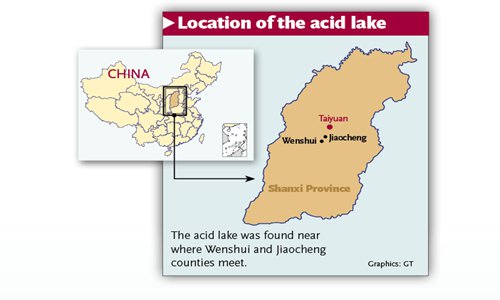
A ticking time bomb
The director of a Shanxi environmental protection company said the oil sold by illegal gas stations is of poor quality, and contains chemicals that can cause cancer, mutations and deformities, and can taint the environment for a long time.
"The oil quality is very poor. The trucks that are this oil emit lots of black smoke and these trucks are very dirty," said a worker at a Sinopec gas station.
Indeed, the acidic waste produced by the refineries is a ticking time bomb.
It's estimated that Shanxi produces more than 20,000 tons of acidic sludge annually, much of which is illegally dumped rather than reprocessed.
One ton of concentrated sulfuric acid used for the waste oil washing method produces 2 tons of acid sludge.
"Based on conservationists' estimations, more than 10,000 tons of concentrated sulfuric acid is used every year in Shanxi, producing more than 20,000 tons of acid sludge," a person familiar with the waste oil industry told the Southern Weekly newspaper on condition of anonymity.
In July 2016, an "acid lake" in the province entered public view for the first time.
According to locals, the lake first appeared in 2000 after refineries started dumping their sludge there. It is about four meters deep and covers an area of about 30 mu (two hectares).
The lake is normally covered by dirt but when heavy rain hit this area last July, an unbearable smell emerged.
Xue Yuzhen, deputy director of the Lüliang city environmental protection bureau, explained that someone reported the lake to the authorities, prompting local officials requesting to have the issue examined.
But according to villagers, there are several acid lakes like this in this area. The acid has penetrated into the groundwater and some people worry that if this continues, the water in the area will be unusable for decades to come.
In Xiaoxin village, residents already have problems with drinking water. They have to transport water from eight kilometers away and villagers can only fetch water from one tap from 11 am to 1 pm.
Making changes
When interviewed by the Economic Information Daily, experts said that crackdowns on these refineries are ineffective, as they just start working again after the government campaigns finish.
On October 23, 2016, two people were killed by poisonous gas from an oil refinery.
An insider revealed that the deceased were the owner of a workshop and his driver. The workshop had been shut down during a police raid in the summer and the owner was arrested. But after the crackdown finished, they started production again.
One of the biggest problems is that these crackdowns involve many government departments working together including commercial, firefighting, safety inspection, quality inspection and environmental protection authorities. Each department is only in charge of one small part of the overall campaign, making their work highly inefficient.
A firefighting official said that once they get a report from a citizen, they have to send requests to the commercial and safety inspection authorities and local police before they can conduct a joint law enforcement operation.
An official with the Hejin commercial bureau said that "inspections cure only symptoms, not the disease itself. Some illegal gas stations close their doors beforehand."
Also, compared with the revenue generated from these businesses, the threatened fines are insignificant. An official in Linfen, Shanxi said that the most they can fine someone for illegally refining oil is 30,000 yuan. Due to a lack of staff, officials tend to use fines to punish illegal gas stations, but this does little to stop the supply of knockoff diesel.
A Southern Weekly newspaper investigation found that some refineries are becoming even more furtive and trying to "whitewash" themselves by registering as legal businesses and claiming that they're operating recycling programs.
Some have even secured certification and passed official environmental evaluations.
Geng Yeqiang, a professor at the School of Economics and Management of Shanxi University, told the Economic Information Daily that a public monitoring and reporting system is urgently needed.
"Government departments should work together to figure out the illegal gas station industrial chain and contain it at the source," he said.
He Zhongwei, an official with the Shanxi environmental protection department, said that so far, they have arranged an investigation into Lüliang's pollution-affected areas and the dumping of acidic sludge. Next, they will conduct surveys into local soil affected by illegal oil refineries.


















































